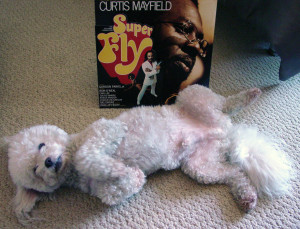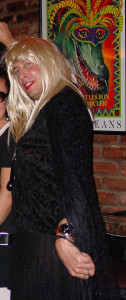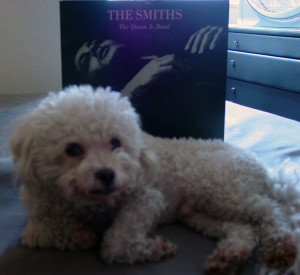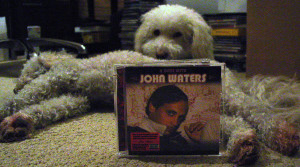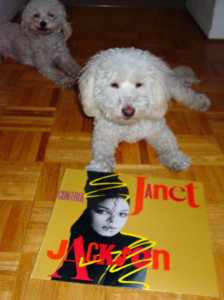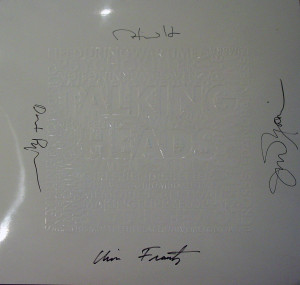
In 1979, the Village People released “Go West,” a celebratory disco romp whose message to listeners in the know was “go west, young man, to San Francisco, a utopia for gays.” The lyrics included “Together we will love the beach / Together we will learn and teach.” And “I love you, I know you love me. I want you happy and carefree / So that’s why I have no protest when you say you want to go west.”
San Francisco was a popular gay destination and in 1977, home to the nation’s first openly gay elected official, Harvey Milk.
In 1993, Pet Shop Boys released their cover of “Go West.” They kept all the Village People’s lyrics and they kept the dance beat, yet their version has a tinge of melancholy.
The duo’s Chris Lowe explained “When the Village People sang about a gay utopia it seemed for real, but looking back in hindsight it wasn’t the utopia they all thought it would be.”
Tunes du Jour readers – join me as we go back in time and look at the evolution of a gay dance classic.
Disco music was born in the early seventies in black, Hispanic and gay clubs. As explained in The Queer Encyclopedia of Music, Dance and Musical Theater, “Perhaps no other popular art form is more closely identified with gay culture than disco and dance music. Gay men in particular adopted the intense, loud, thumping 4/4 beat of the dance music predominantly at the bars and discos that were among the few places where they could openly express their sexual identities in the 1970s and 1980s. As the musical backdrop for generations of gay men who came of age is such venues, dance music became inextricably connected with the gay experience.”
Disco really hit the mainstream in 1977 with the release of the film Saturday Night Fever, based on a magazine article. The film’s soundtrack album became the biggest-selling album of all time in the United States, a record it held until Michael Jackson’s Thriller surpassed it.
As disco became a major commercial force, many rockers, including The Rolling Stones, Rod Stewart and Kiss, turned to the genre to score some of the biggest hits of their careers.
In June of 1978, the Village People entered the pop top 40 with their first crossover hit, “Macho Man.” Hard as it may be to believe, most people at that time had no idea they were gay, despite the costumes and despite song titles such as “Hot Cop,” “San Francisco,” “Sodom and Gomorrah,” “Key West” and “Fire Island.” Everyone in the whole family enjoyed their second hit, “Y.M.C.A.,” where one can “hang out with all the boys.”
In March of 1979 the group scored their third hit single in under a year – “In the Navy.” The U.S. Navy considered using it as a recruitment theme. Said a Navy spokesperson, “The words are very positive. They talk about adventure and technology. My kids love it.”
During the Seventies San Francisco remained a popular destination for gays. A report by Alfred Kinsey in the early 1970s found: “San Francisco is generally considered the best city in the U.S. for homosexuals. It was partly due to the city’s ‘tradition of tolerance.’ Another factor was the city’s size and geography, as it is smaller and less residentially dispersed than New York or Los Angeles, which made it “more conductive to a tightly knit homosexual community.”
In March of 1978 the San Francisco Board of Supervisors passed “the most stringent gay rights laws in the country.” Elsewhere in the U.S., the few existing gay rights laws were rapidly being repealed.
In June of 1978 San Francisco’s Gay Freedom Day Parade drew approximately 350,000 marchers.
On May 21, 1979, Dan White, the assassin who killed gay rights leader Harvey Milk as well as San Francisco’s mayor, was sentenced to only seven years and eight months in prison. The verdict led to massive riots in that city in which demonstrators burned a dozen police cars and more than 160 people, including 50 policemen, were injured. This happened just days after the Village People released their follow-up to “In the Navy,” “Go West.” Suddenly, San Francisco didn’t seem as peaceful and idyllic as it does in that song.
A few weeks later, a disc jockey from a Chicago rock radio station hosted an anti-disco demonstration at Comiskey Park between two baseball games in a double-header. Tens of thousands of people brought disco records to be set ablaze in center field while the crowd chanted “disco sucks.” I’d posit that this was in effect an anti-gay anti-black demonstration by white heterosexual rock fans.
Authors Andrew Edelstein and Kevin McDonough agree. In their book The Seventies they wrote “If you were a white, heterosexual teenage male who preferred to wear jeans and a t-shirt and sit passively at a stadium-size rock concert, then disco could be an especially threatening experience.”
After the Comiskey Park demonstration, disco quickly went back underground and was heard primarily in gay clubs. It soon came to be called house music and hi-nrg.
It should be noted that while rock fans tried to kill disco in the U.S., it stayed popular in the U.K., Europe, and elsewhere in the world.
The 1980s brought about the rise of the so-called Moral Majority in the United States. Not coincidentally, it also brought the scourge that came to be known as AIDS, which initially hit the gay population hardest. Homophobia contributed to a delayed response by the government.
Ten years into the AIDS epidemic there was still no sign of an effective treatment or cure.
In 1992 the British duo Pet Shop Boys were invited to perform at an AIDS fundraiser. Chris Lowe came up with the idea to do the Village People’s “Go West.” He played the record for his singing partner, Neil Tennant, who called it “ghastly” and “awful.” He got more into it when he thought about what he and his partner could bring to it, including the addition of “a big choir of butch men.”
A year later, the Boys released their studio recording of the song, complete with the big choir of butch men. In the context of the AIDS pandemic and the devastation it caused, particularly to the gay population, the song “Go West” takes on a different meaning than it did in 1979. As the website Shmoop puts it, “The sunny utopia the Village People had once sung of was literally full of sick and dying people; hospital beds in San Francisco were full of dying patients and there seemed to be no end in sight.”
The spread of AIDS led to a rise in gay activism, which is acknowledged in a verse the Pet Shop Boys added to their version: “There, where the air is free, we’ll be what we want to be / Now, if we take a stand, we’ll find our promised land.”
Of this record, Wayne Studer, in his book Rock on the Wild Side, a collection of songs by or about gay males, wrote “As the Boys do it, ‘Go West’ becomes an eerily uplifting disco dirge, both happy and sad at the same time. Extraordinary.”
Both the Village People’s and Pet Shop Boys’ “Go West” failed to cross over to the Top 40 of the U.S. pop charts; however, both were hits in the dance clubs, with the Pet Shop Boys version going to #1 on the U.S. Dance Club chart. The Pet Shop Boys version did make the top ten pop charts in the U.K., Germany, France, Austria, Sweden, Switzerland, the Netherlands, Norway, Ireland, Italy, Japan and Australia.
It was around this time that Neil Tennant, the duo’s usual vocalist and lyricist, came out, to the surprise of nobody.
“Go West” was the second single released from the group’s fifth album, Very, an album that is included in the book 1001 Albums You Must Hear Before You Die. The opening line of the book’s write-up is “Though the Pet Shop Boys had always been really gay, Very was their first really, really gay album – and their first U.K. number 1.”
Very produced four top ten club hits in the U.S., including two #1’s – “Go West” and “Can You Forgive Her?”
In 2008 Australian web-site SameSame polled their listeners to find the “gayest songs of all-time.” Pet Shop Boys’ “Go West” came in at #6. The Village People’s “In the Navy” was #18, their “Macho Man” was #16, and their “Y.M.C.A.” was named the second gayest song of all-time, kept from the top spot by ABBA’s “Dancing Queen.”
Pet Shop Boys’ album Very made Out magazine’s list of the Gayest Albums of All-Time. It also made British music magazine Q’s list of the 100 Greatest British Albums Ever. It has sold over five million copies worldwide.
Where has “gay music” come since the release of Very? Here are two interesting facts: the very first openly gay artist to have a #1 album in the U.S. was Adam Lambert, and that happened just two years ago. One year earlier, a song went to #1 on the U.S. pop charts and stayed there for six weeks – a song that explicitly called on gays, lesbians, bisexuals and transgenders to love who they are, ‘cause baby we were born this way.
As for the key players in my story, Pet Shop Boys have sold over 50 million records worldwide, had twenty-two top ten hits in the U.K. thus far, and won Outstanding Contribution to Music at the 2009 BRIT Awards, England’s equivalent to the Grammys. Their most recent album, 2013’s Electric, hit #3 on the UK album chart. It included the single “Vocal,” a top three club hit stateside.
The Village People still tour with three of their original members. They have sold over 100 million records.
Despite the efforts of some folks, disco, while suffering some setbacks, didn’t die. As a matter of fact, one of last year’s most popular hits was Daft Punk’s “Get Lucky,” a disco-influenced record featuring guitar work by Nile Rodgers of the seventies disco band Chic.
Similarly, despite the efforts of some folks, the LGBT populations, while suffering some setbacks, continues to make great strides toward equality and respect.
Should you attend this Sunday’s Gay Pride Parade in West Hollywood, or any Gay Pride Parade this season, you will hear coming from many floats disco and house music, for that is the soundtrack of our movement.
I wish all my readers a very happy Pride. Dance!
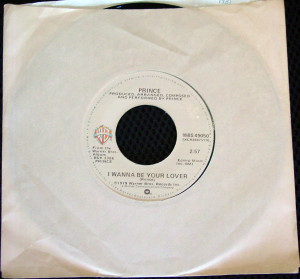 “I Wanna Be Your Lover” was Prince’s first US Top 40 hit, reaching #11 in 1980.
“I Wanna Be Your Lover” was Prince’s first US Top 40 hit, reaching #11 in 1980.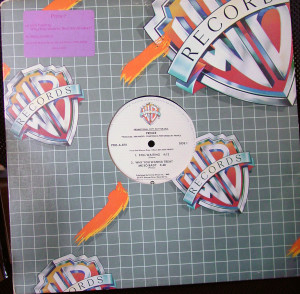 “Still Waiting” is a track that appears on Prince’s self-titled second album, the same record that spawned “I Wanna be Your Lover.” It’s not his best track, but how cool is it that I have a promotional 12-inch single from Prince’s pre-superstar days?
“Still Waiting” is a track that appears on Prince’s self-titled second album, the same record that spawned “I Wanna be Your Lover.” It’s not his best track, but how cool is it that I have a promotional 12-inch single from Prince’s pre-superstar days?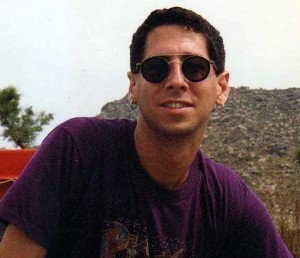 Prince’s 1999 album was released in October 1982, one month prior to Michael Jackson’s Thriller. I remember taking the train to Harvard Square and buying both albums at the university bookstore. Shortly thereafter I bought a 1999 t-shirt, which I still have. Though I wear it regularly, its color hasn’t faded at all, there are no tears, and it fits me perfectly. Back then they made t-shirts of better quality. Kids today don’t know what good t-shirts are.
Prince’s 1999 album was released in October 1982, one month prior to Michael Jackson’s Thriller. I remember taking the train to Harvard Square and buying both albums at the university bookstore. Shortly thereafter I bought a 1999 t-shirt, which I still have. Though I wear it regularly, its color hasn’t faded at all, there are no tears, and it fits me perfectly. Back then they made t-shirts of better quality. Kids today don’t know what good t-shirts are.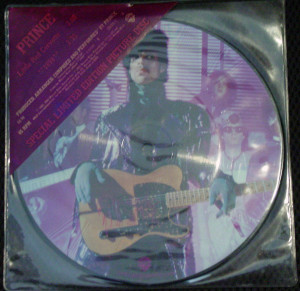 Prince first US Top Ten single was 1983’s “Little Red Corvette.” The song is from his 1999 album, presently at #36 in my Top 100 Albums of All Time list. The song inspired Stevie Nicks to write “Stand Back,” on which Prince played keyboard.
Prince first US Top Ten single was 1983’s “Little Red Corvette.” The song is from his 1999 album, presently at #36 in my Top 100 Albums of All Time list. The song inspired Stevie Nicks to write “Stand Back,” on which Prince played keyboard.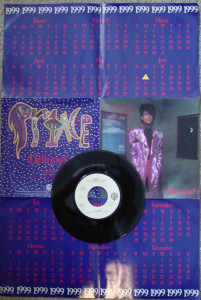 “Delirious,” also from 1999, was the follow-up to “Little Red Corvette” and also hit the top ten. The 45 came wrapped in a poster of Prince which had a calendar of the year 1999 on the other side.
“Delirious,” also from 1999, was the follow-up to “Little Red Corvette” and also hit the top ten. The 45 came wrapped in a poster of Prince which had a calendar of the year 1999 on the other side.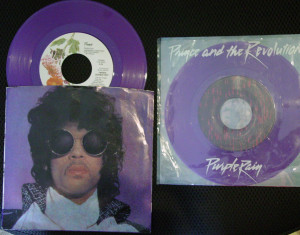 “When Doves Cry” was the first single released from the Purple Rain soundtrack, my #4 Album of All-Time. It became Prince’s first #1 single. It holds the distinction of being the only track without a bassline to go to #1 on the Dance Club chart. Like the album’s title track, the 45 was pressed on purple vinyl.
“When Doves Cry” was the first single released from the Purple Rain soundtrack, my #4 Album of All-Time. It became Prince’s first #1 single. It holds the distinction of being the only track without a bassline to go to #1 on the Dance Club chart. Like the album’s title track, the 45 was pressed on purple vinyl.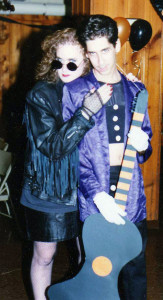 My Halloween costume in 1987 was Prince, inspired by his Parade: Music From The Motion Picture Under the Cherry Moon period. That album, #38 on my Top Albums list, includes Prince’s third #1 pop single, “Kiss.” He wrote the song for the band Mazarati, who were signed to his Paisley Park label. When he heard what the band did with the song, he took it back, replacing the group’s lead vocals with his and adding a guitar lick. Some more trivia – the week “Kiss” went to #1, the #2 song in the US was “Manic Monday” by Bangles. Per that record, the writer of that song was “Christopher.” In actuality, Christopher was a pseudonym for Prince, who also wrote under the names Jamie Starr (The Time’s “Jungle Love”) and Alexander Nevermind (Sheena Easton’s “Sugar Walls”).
My Halloween costume in 1987 was Prince, inspired by his Parade: Music From The Motion Picture Under the Cherry Moon period. That album, #38 on my Top Albums list, includes Prince’s third #1 pop single, “Kiss.” He wrote the song for the band Mazarati, who were signed to his Paisley Park label. When he heard what the band did with the song, he took it back, replacing the group’s lead vocals with his and adding a guitar lick. Some more trivia – the week “Kiss” went to #1, the #2 song in the US was “Manic Monday” by Bangles. Per that record, the writer of that song was “Christopher.” In actuality, Christopher was a pseudonym for Prince, who also wrote under the names Jamie Starr (The Time’s “Jungle Love”) and Alexander Nevermind (Sheena Easton’s “Sugar Walls”).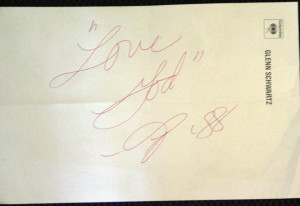 One afternoon in 1988 Prince did an impromptu autograph signing at the Sam Goodys a block away from my office. I told my boss I’d be right back and I wormed my way to the front of the line. He was there to promote his Lovesexy album, which includes “Alphabet St.” I already had the album (on its first day of release, of course!), so he signed a piece of stationery I took from my office.
One afternoon in 1988 Prince did an impromptu autograph signing at the Sam Goodys a block away from my office. I told my boss I’d be right back and I wormed my way to the front of the line. He was there to promote his Lovesexy album, which includes “Alphabet St.” I already had the album (on its first day of release, of course!), so he signed a piece of stationery I took from my office.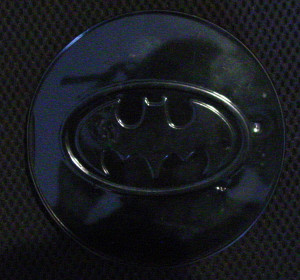 “Batdance” was Prince’s fourth #1 single. It appears on his Batman soundtrack though was not used in the film. The CD of the Batman soundtrack was released in a tin case.
“Batdance” was Prince’s fourth #1 single. It appears on his Batman soundtrack though was not used in the film. The CD of the Batman soundtrack was released in a tin case.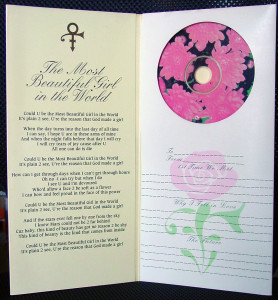 During one of his fights with Warner Bros. Records, Prince self-released a single of “The Most Beautiful Girl in the World,” which was available by mail order in an oversized greeting card.
During one of his fights with Warner Bros. Records, Prince self-released a single of “The Most Beautiful Girl in the World,” which was available by mail order in an oversized greeting card.
